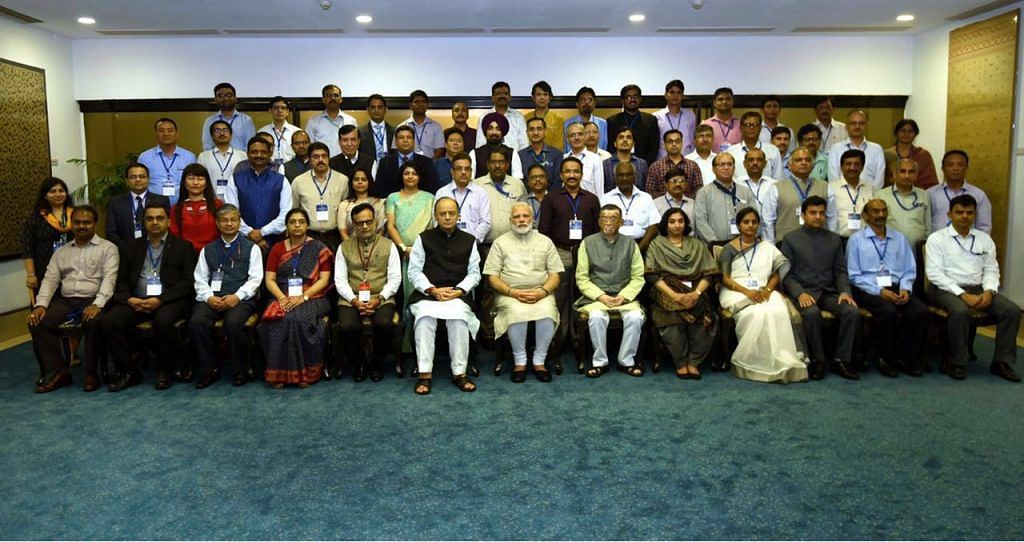A rupee collected by indirect tax officers has as much worth in the nation’s well-being as a rupee collected by direct tax officers.
A few members of the Indian Revenue Service (Income Tax) Association had written to the ministry of finance, the Union Public Service Commission (UPSC) and the Central Board of Direct Taxes (CBDT) stating their discontent with the use of a common name for the two Indian Revenue Services in official matters.
The two services being the Indian Revenue Services-Income Tax (IRS-IT) and the Indian Revenue Services-Customs and Indirect Taxes (IRS-CIT). Both have been commonly referred to as the IRS.
ThePrint, then, published an article on this ‘battle of supremacy’ in the IRS.
Also read: We are the real IRS, don’t call us ‘I-T’, say India’s taxmen
A statement from the IRS-IT Association in the article claimed that the IRS-IT was the “real IRS”. This raised many eyebrows. In fact, the general secretary of the IRS-IT Association has gone to the extent of saying, “We are a much bigger service with a much bigger clientele… writing ‘I-T’ in front of our service only dilutes the weight of the service. IRS is a known brand name associated with income tax”.
Such a statement tends to mark one service as superior at the other’s expense and, therefore, is highly objectionable.
It is pertinent to mention that tax collection in India is composed of both direct as well as indirect taxes. Direct taxation is looked after by the IRS-IT, whereas, indirect taxation is looked after by the IRS-CIT.
The tax collection trend shows that both direct and indirect taxes have had an equally significant role in contributing to nation’s tax kitty; albeit their respective contributions have evolved with the changing structure of the economy.
| FY | Share of direct taxes in total tax collection | Share of indirect taxes in total tax collection |
| 2000-01 | 36.3% | 63.7% |
| 2007-08 | 53.0% | 47.0% |
| 2016-17 | 49.50% | 50.4% |
Data for FY 2000-01 and 2007-08 has been obtained from http://www.mospi.gov.in/statistical-year-book-india/2017/175
Data for FY 2016-17 has been obtained from a press release of Ministry of Finance dated 4 April 2017
Given the above data, how can one revenue service be more “real” than the other? Both the services collect revenue and hence both are worthy of being named the Indian Revenue Services. After all, a rupee collected by indirect tax officers is as much worthy of contributing to the nation’s well-being as a rupee collected by direct tax officers.
Also read: Behave properly with taxpayers: Income tax department tells its officers
The general secretary of the IRS-IT Association has pointed out the lone incident of the transfer of customs officials from Mumbai as an alibi and mentioned that such incidents dilute the IRS brand name. To quote an isolated event without context, and that too when the relevant proceedings haven’t attained finality, is highly irresponsible. Moreover, is the other IRS-IT saintly? The recent incidents like the arrest of an income tax commissioner in Guwahati for bribery don’t suggest so.
However, the intention is not to point fingers. Both the services, whether the IRS-IT or the IRS-CIT, have had many bold and honest officers and such incidents dilute not just the IRS brand name, but the brand name of India.
People also often miss the role played by the IRS-CIT outside the routine domain of tax collection, which is not performed by the IRS-IT.
First, the IRS-CIT was pivotal in launching the Goods and Services Tax (GST). By virtue of their knowledge and experience in erstwhile Central Excise and Service Tax regime, they drafted the new GST law, which in turn was replicated at the level of states.
The implementation of the GST is a commendable example of cooperative federalism. IRS-CIT officers had an immense contribution in the same by ensuring its smooth implementation. Central and state government officials are working together on a pan India scale in the sensitive domain of tax collection for the first time.
Second, the scope of the IRS-CIT in terms of functions is far wider than the IRS-IT. The Customs wing of the IRS-CIT thwarts revenue leakage from the country by curbing illegal trade and preventing smuggling of precious, semi-precious metals, counterfeit currency and antiques. The Central Bureau of Narcotics which is manned by IRS-CIT officers is involved in the licit cultivation of narcotics drugs used for medicinal purposes and checking the illicit supply of narcotics drugs, thus strengthening the nation’s security.
Also read: Become a black money informant, take home up to Rs 5 crore, says Income Tax department
It would not be an exaggeration to say that officers from the IRS-CIT in coordination with several other agencies like the BSF, the NIA, and the ED guard the economic frontiers of the nation. Moreover, the IRS-CIT has played an important role in conserving the environment by curbing illegal poaching of wildlife on sensitive borders.
It is surprising that people from the IRS-IT, on the other hand, have authored such a divisive letter. People from the IRS-CIT, however, believe in contributing in a united fashion. The GST has ushered in large scale formalisation of the economy, which in turn has augmented the income tax payer base. Rising fiscal deficit of the country demands both the services to work in unison rather than bickering that one is more “real” than the other.
The brand attached to a name is built by contribution, not nomenclature. In no way has one service contributed less than the other. Hence, logic demands that in accordance with their respective constitutional mandate both services be named as IRS-IT and IRS-CIT.
Kanika Dua, IRS (Customs and Indirect Taxes) and currently serving as an Assistant Commissioner in New Delhi. Views in this article are personal and does not represent view of the authorities.
